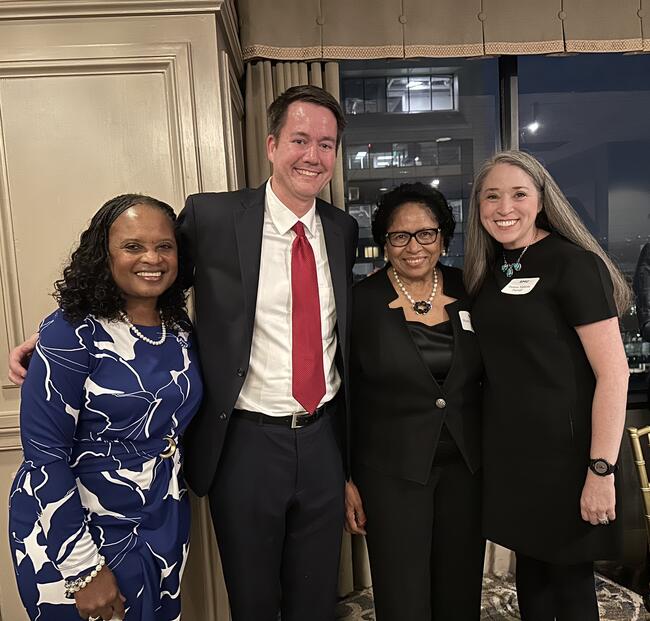You have /5 articles left.
Sign up for a free account or log in.

From left, Jennifer “JJ” Jones, Michael Harris, Ruth Simmons and Teresa Valerio Parrot.
Teresa Valerio Parrot
Those who know me are well aware that I have a professional crush on Ruth Simmons. I have talked about how much I admire her career and the bold stances she has taken publicly and taken opportunities to ask others about how she has encouraged and mentored them. When presented with a chance to meet her, I quickly bought an airline ticket and counted down the days.
For those who are unfamiliar with her career, she was the first Black president of an Ivy League institution; holds the title of president emerita of Smith College, Brown University and Prairie View A&M University; and as of this past weekend, has been awarded 41 honorary degrees.
The last of these degrees was conferred by Southern Methodist University, which is where I earned my doctoral degree. Michael Harris, a professor at SMU, was the Faculty Senate president who nominated Simmons to receive the award. As a result, he was invited to the dinner given in her honor, and it was my great fortune his wife was unable to attend. He jokes that only one person references Simmons as often as I do, and he felt obligated to ask if I was interested in attending.
Prior to the dinner, Simmons was the speaker at a campuswide symposium, where signed copies of her book, Up Home, were distributed to attendees. She spoke about her childhood and career, offering advice to all in attendance.
Her final statement felt like a follow on to my last “Call to Action” piece, which encouraged everyone to fight on behalf of higher education:
“It’s in those moments, even when you’re wrong or when people think you’re wrong, that you’re elevated. It’s in those moments that you stand for something and know what is beyond the pale, in the things that you see before you. And so if, like my mother, you see somebody being unfairly treated, how dare you be silent? How dare you if you see someone doing something that trespasses. What should we be doing as human beings? How dare we not say something?
“So the question I get when I do my book events, from students and everyone else, is ‘What should I be doing in this moment?’ Everybody’s question is ‘What should I be doing now?’ I don’t have an answer for everybody, but I do know that at 80 years old, I get up every day ready to do something, and that’s what I always answer. ‘You’ve got to do something.’ It is not a moment to sit on the sidelines and be comfortable and say, ‘Oh, let everybody else worry about that.’ Shame on you if you draw that conclusion right now.”
I couldn’t agree more.
Like Ruth Simmons, I’ve received many questions from people who are unsure how or if they can fight, having read my recent piece. Some colleagues feel they can’t fight because they are in red states, or they worry they could put themselves or their institutions at risk through their actions. Others feel they lack the credibility or the authority to lead a fight. Still others worry they need to take on the fight on behalf of the whole industry and are already exhausted.
Fighting on behalf of higher education isn’t a one-size-fits-all endeavor. I would encourage, as Simmons notes, that this can include addressing mistruths, defending those who are being treated unfairly and speaking out when the moment demands it. I believe that fighting for higher education means that we each defend the academy within our spheres of influence in big and small ways.
For example, arm yourself with facts and be prepared to address misinformation you may hear about the “Big Beautiful Bill,” which was just approved by the House GOP and has been sent to the Senate. As passed by the House, it includes limiting Pell eligibility and eliminating subsidized student loans.
Know what the impact of the House’s proposed endowment tax will be on the institutions that will be impacted. Be versed in how institutions are reeling from the elimination of research grants and how the bill will now further impact them. It is clear to me that these are the first cuts for institutions, but they won’t be the last. The goal is to have fiscal death by a thousand cuts. I would argue it is our responsibility to speak out—to fight— when we hear people discussing the federal budget and grant cuts and explain the impacts these cuts are having on student persistence, on campuses, on research, and on everyday people.
Despite my choice of language and the traditional connotation associated with it, I don’t think of fighting as only a negative concept. Or, at the very least, I was raised in a Hispanic household where the duality of challenge and support was viewed as a given, rather than a negative. A colleague of mine said that he felt my language was solely confrontational. I suggested in response that fighting to me means asserting an alternative, which includes sharing expertise, data and information, and serving as a sense maker. I believe it covers addressing falsehoods and defending the truth. It is up to each of us if we view and live this only as a negative.
It’s possible that Simmons’s advice feels aligned with my thinking because I want so dearly to be aligned with her, but the reality is that there’s something about a fighter that is always aligned with another fighter, and for that reason I hope you’ll see yourself in her words and in mine. Once again, I invite you to fight.




